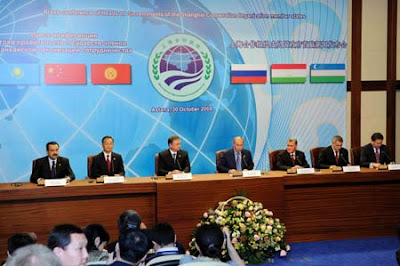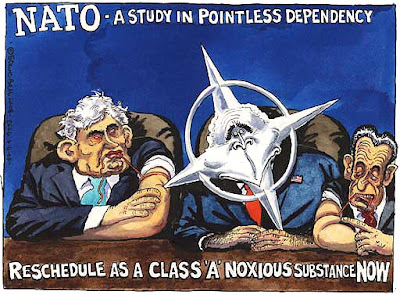 Any discussion on regional integration in Central Asia will inevitably prompt a discussion of key actors like SAARC; ASEAN and SCO.
Any discussion on regional integration in Central Asia will inevitably prompt a discussion of key actors like SAARC; ASEAN and SCO.These days, I don't mince my words on SAARC; I humbly suggest that the 8-member regional group that was established in December 1985 better get its act together or, like Nato, dwindle into irrelevance.
I spent the better part of the weekend reading through wikipedia's rendering of the Shangai Cooperation Organisation, and have to say I was pretty impressed. I couldn't for the life of me understand how an organisation that was established in 2001 had, eight years down the line, a Regional Anti-Terrorism Structure (RATS), yet SAARC that has been 23.5 years in existence had no such structure to fight terrorism when Pakistan, a member, had since 2001 been the bane of the organisation's development insofar as security of the region was concerned!
Remember that discussion on sub-regional imperatives that I've been banging on about? Looks like the gutsy SCO has plenty of that!
Some observers claim that SCO is everything and nothing in the sense that it is a security/political/cultural organisation that comprises non-democracies. Security and political aspects are important because Russia and China are key members, along with some members of what I call the "Stan Family", comprising--Kazakhstan; Kyrgyzstan; Tajikistan; and Uzbekistan. You might have guessed that there are no anglophone countries--unlike the ASEAN Regional Forum, which comprises the USA and Australia.
To top off the fear and loathing of SCO, Iran and India are observers.
I cannot help but wonder why India does not also put some of its efforts into re-dynamising SAARC, as it remains the putative hegemon of that part of Asia. I guess to each his own?
In the specific context of regional integration in Central Asia, observers writing about SCO believe it to be a great contender to Nato. One Michael Bendetson, writing in The Tufts Daily is one of them:
After analyzing NATO’s past actions and future plans in Afghanistan, it appears that only the United States is living up to the lofty expectations established by the
organization. European members are pledging their moral support; however, the future of NATO will depend on the alliance backing up their word with strength. If the majority of members continue to project an image of weakness, the alliance will falter.
He goes on:
In addition to the pressure of internal fragmentation, the power of NATO is being challenged in all areas of the globe. When the Cold War concluded in 1991, NATO was the strongest alliance in the international arena. The Soviet Union and Warsaw Pact had been dissolved, and NATO had been left unchallenged. Unfortunately, a lot has changed in two decades. The most significant of these changes pertains to the establishment of the Shanghai Cooperation Organization (SCO).
The question of Nato is relevant here because as observers have been writing, the elements of Russia and China as powerful members within SCO are equally united in ensuring that Nato does not expand to that part of the world. With the SCO firmly ensconced in Central Asia, desires by Nato to expand eastwards further will be seriously inhibited.
As for Afghanistan, the less said about it the better! It joined SAARC in April 2007, with SAARC playing no central role in its development. However, in November 2005, the SCO-Afghanistan Contact Group was established as a platform to help Afghanistan for reconstruction.
Latest news indicate that the SCO can continue to play a role in Afghanistan, and it makes sense as a stable Afghanistan can only augur well for the rest of the SCO members.
Whatever the case may be; and whatever Western leaders will propound, it is clear that any progressive and critical look at regional integration in Central Asia will continue to encompass a greater role of the Shanghai Cooperation Organisation.


